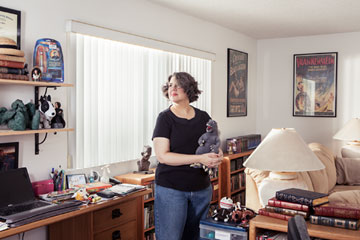
Myers, in her office in Fullerton, Calif., now writes books about the autism spectrum.
When Jennifer Mcilwee Myers was 6 years old, she vowed she would learn the meaning of every word in the English language. That way, she reasoned, she could figure out all of human knowledge without having to ask anyone questions. But she soon encountered a problem that made her furious. Many of the words had the same meaning. Obese, portly, rotund--who needed all these words? Fat is fat. She took her complaint to her father, and he explained that the dictionary definition of a word is not necessarily the same as its emotional and social meaning. That day Jennifer began devoting herself to studying human behavior so she could communicate in a way that made sense to other people. Not until she was 27, however, did she finally find a language that made sense to her: computer coding. By the time she was diagnosed with Asperger's, at the age of 36, she was enjoying a long and lucrative career as a coder.
"The computer's just there," she explains. "It doesn't pick up on context. It doesn't care how I'm feeling. It doesn't care if my facial expression and body posture are correct. Exactly what I say is what it does."
Research and therapy have traditionally focused on understanding and compensating for cognitive problems in people with autism and related disorders--the strategy that Jennifer adopted on her own, starting at age 6. But this emphasis on what's wrong with the autistic brain has obscured a recognition of something just as important: what's right with it.
In 2007, researchers at the Rivière-des-Prairies hospital at the University of Montreal published a study showing that the measure of autistic intelligence depended on what tests the subjects were given. When children with autism took a test that depended on providing information they could have learned only through social interactions--for instance, "What is the thing to do if you find an envelope in the street that is sealed, addressed and has a new stamp on it?"--one-third qualified as "low functioning." Yet when the same subjects took a test that depended on providing only nonverbal information--arranging blocks into designs, for example--only 5% were labeled low-functioning. What's more, one-third qualified as having "high intelligence."
"We conclude," the Montreal group reported, "that intelligence has been underestimated in autistics."
Don't get me wrong. I'm not saying that autism is a great thing and all people with autism should just sit down and celebrate our strengths. Instead, I'm suggesting that if we can recognize, realistically and on a case-by-case basis, what an individual's strengths are, we can better determine the future of the individual--a concern now more than ever, as the rate of autism diagnoses reaches record levels.
I also want to be clear that when I say strengths, I'm not talking about savant skills like those of Stephen Wiltshire, who needs only one helicopter tour of a city to draw the entire landscape down to the last window ledge, or Leslie Lemke, who needs to hear a piece of music only once to re-create it on the piano. Only about 10% of the tens of millions diagnosed as autistic belong in the savant category (though about half of savants are autistic).
So what strengths can we look for?
BOTTOM-UP THINKING
